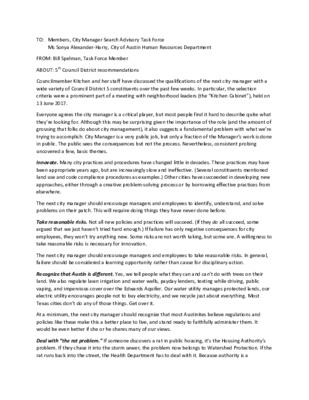District 5 Feedback — original pdf
Backup

TO: Members, City Manager Search Advisory Task Force Ms Sonya Alexander‐Harry, City of Austin Human Resources Department FROM: Bill Spelman, Task Force Member ABOUT: 5th Council District recommendations Councilmember Kitchen and her staff have discussed the qualifications of the next city manager with a wide variety of Council District 5 constituents over the past few weeks. In particular, the selection criteria were a prominent part of a meeting with neighborhood leaders (the “Kitchen Cabinet”), held on 13 June 2017. Everyone agrees the city manager is a critical player, but most people find it hard to describe quite what they’re looking for. Although this may be surprising given the importance of the role (and the amount of grousing that folks do about city management), it also suggests a fundamental problem with what we’re trying to accomplish: City Manager is a very public job, but only a fraction of the Manager’s work is done in public. The public sees the consequences but not the process. Nevertheless, consistent probing uncovered a few, basic themes. Innovate. Many city practices and procedures have changed little in decades. These practices may have been appropriate years ago, but are increasingly slow and ineffective. (Several constituents mentioned land use and code compliance procedures as examples.) Other cities have succeeded in developing new approaches, either through a creative problem‐solving process or by borrowing effective practices from elsewhere. The next city manager should encourage managers and employees to identify, understand, and solve problems on their patch. This will require doing things they have never done before. Take reasonable risks. Not all new policies and practices will succeed. (If they do all succeed, some argued that we just haven’t tried hard enough.) If failure has only negative consequences for city employees, they won’t try anything new. Some risks are not worth taking, but some are. A willingness to take reasonable risks is necessary for innovation. The next city manager should encourage managers and employees to take reasonable risks. In general, failure should be considered a learning opportunity rather than cause for disciplinary action. Recognize that Austin is different. Yes, we tell people what they can and can’t do with trees on their land. We also regulate lawn irrigation and water wells, payday lenders, texting while driving, public vaping, and impervious cover over the Edwards Aquifer. Our water utility manages protected lands, our electric utility encourages people not to buy electricity, and we recycle just about everything. Most Texas cities don’t do any of those things. Get over it. At a minimum, the next city manager should recognize that most Austinites believe regulations and policies like these make this a better place to live, and stand ready to faithfully administer them. It would be even better if she or he shares many of our views. Deal with “the rat problem.” If someone discovers a rat in public housing, it’s the Housing Authority’s problem. If they chase it into the storm sewer, the problem now belongs to Watershed Protection. If the rat runs back into the street, the Health Department has to deal with it. Because authority is a patchwork, it’s in the short‐term best interests of every department to pawn the problem off to someone else, not solve it themselves. The next city manager should recognize the limitations of current department responsibilities and establish an environment conducive to interdepartmental problem‐solving. Be a stage manager, not a movie star. The City employs 13,500 people to pick up trash, put out fires, catch crooks, and keep the water and lights on. The city manager’s primary role is to make sure those employees have the resources, information, and guidance they need to set priorities, solve problems, and do their jobs. Good management is critical, but the role itself is neither glamorous nor heroic. The next city manager should recognize that Austin doesn’t need to be the “best managed city.” It needs to be the best city. Everybody matters. Candidates with experience in highly politicized or media‐rich environments may have developed the bad habit of paying too much attention to the biggest and squeakiest wheels. But the city manager works for the city council and the public, not just for a few important people and interests. The next city manager must attend to problems throughout the city, not just the concerns of people with status and power.